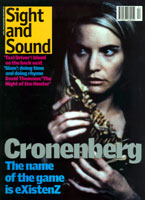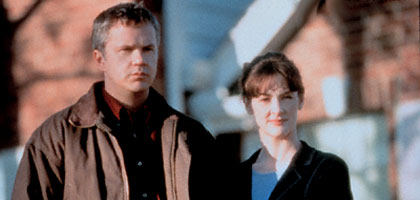
Arlington Road
USA/UK 1998

Reviewed by Ken Hollings
Synopsis
Our synopses give away the plot in full, including surprise twists.
History professor Michael Faraday lives with his son Grant in a suburban street near Washington DC. Their new neighbours from St Louis are Oliver Lang, his wife Cheryl and their three children. Following an accident Michael rushes Lang's son to hospital, and the two households become friends. While Grant is slow to accept Michael's new girlfriend Brooke, Michael's university course on urban terrorism reawakens painful memories of his FBI-agent wife's death. Odd lies lead Michael to suspect Lang is connected to a bomb attack in St Louis, but no one believes him. He suspects Lang is planning a similar outrage in DC. Even when he reveals Lang tried to bomb a government office before, Lang shames Michael, accusing him of invading his privacy.
After witnessing Lang visiting the Liberty Delivery Service, Brooke is suddenly killed in a car crash. Michael uncovers evidence linking Lang to the St Louis bombing but is prevented from using it when Lang kidnaps Grant. Lang admits to murdering Brooke and discloses his new target: the FBI's DC headquarters. Michael intercepts a Liberty Delivery Service van, believing it contains both Grant and the explosives. Having pursued the van into the FBI's underground garage, Michael realises too late he is carrying the bomb in his own car and is killed in the explosion. The media describes Michael as a terrorist. The Langs wonder where their next home will be.
Review
Reverberations from the Oklahoma and World Trade Center bombings continue to run slow and deep in the US. Following The Siege and The X Files movie, this is at least the third major US release to feature the FBI losing a prime piece of real estate to terrorists. From its opening sequence, in which Lang's young son Brady staggers down the middle of the street unaware his hand has been mutilated, Arlington Road establishes itself as a psychological thriller more concerned with questions of perception than motivation. "We don't know why he did this," history professor Michael Faraday says of the lone bomber thought to be responsible for killing 63 people in St Louis, "and we'll never know. And still we feel safe because we know his name." Michael's argument is not with the facts but their interpretation: "We wanted one name and we wanted it fast." This neatly lays the ground for the film's final irony, concerning the identity of who it is that blows up the FBI's Washington headquarters, killing 184 people.
As the liberal academic Faraday, Jeff Bridges gives a finely graded portrayal of a decent man struggling to conceal feelings of resentment against the establishment. Ultimately his struggle blinds him to how much he resembles the terrorist Lang. From the moment a hospital orderly mistakenly assumes Faraday to be Brady's father, the sinister parallels and similarities begin to multiply. Faraday and Lang both feel betrayed by their government and share the same belief in family values. A perfect match for Faraday's closeted liberalism, Lang articulates right-wing notions of self-reliance with candour. Claiming to be a structural engineer, he refers earnestly to "the buildings I leave behind". But it's Faraday whose workroom is plastered with anti-federal, white-supremacist posters while Lang's study is neatly hung with framed prints of Thomas Jefferson's Montecello, New York's Woolworth Building and the St Louis Arch. Even Lang's real name, Michael Fenimore, echoes Faraday's.
After Faraday's son is kidnapped, the film takes on an increasingly hallucinatory quality. Scenes end in slow fades to deep black. A 70s disco party at which Lang reveals that Brooke has been murdered is bathed in subterranean greens and blues. White light bleaches out a harsh close-up on Faraday's sweating face as he begins to comprehend his entrapment.
During the final chase, Bobby Bukowski's deliberately erratic photography suggests an ever-more skewed sense of perspective.
The editing contrasts asphalt-level shots of road surfaces with detailed crane shots of the Washington Mall, tidily laid out as if part of some architectural model or designer's plan. Long-term David Lynch collaborator Angelo Badalamenti, whose moody score gives the film's earlier scenes of neighbourly peace and good order an edge, supplies a pummelling, bass-heavy charge to the final descent into the FBI's underground car park. Perhaps the most unsettling aspect of Arlington Road, however, is not the sight of smoke rising over the Capitol, nor even the media's distorted speculations concerning the final bomber's 'motive', but that Lang's reasons for acting as he does remain as mysterious as ever.
Credits
- Screenplay
- Ehren Kruger
- Director of Photography
- Bobby Bukowski
- Editor
- Conrad Buff
- Production Designer
- Thérèse DePrez
- Music
- Angelo Badalamenti
- ©Lakeshore Entertainment Corp.
- Production Companies
- PolyGram Filmed Entertainment presents in association with Lakeshore Entertainment
- a Gorai/Samuelson production
- Executive Producers
- Tom Rosenberg
- Sigurjon Sighvatsson
- Ted Tannebaum
- Co-executive Producers
- Judd Malkin
- Ed Ross
- Producers
- Peter Samuelson
- Tom Gorai
- Marc Samuelson
- Co-producers
- Jean Higgins
- Richard S. Wright
- Associate Producers
- Ellen Dux
- James Mcquaide
- Production Supervisor
- Tamara Allen
- Unit Production Manager
- Jean Higgins Tyson
- Location Managers
- Susan Elkins
- Washington DC Unit:
- Peggy Pridemore
- Post-production Co-ordinator
- Carmen Abramian
- 2nd Unit Director
- Vince Deadrick Jr
- Assistant Directors
- Jerry Grandey
- William Paul Clark
- Darrell Woodard
- Pilar Savone
- Kathleen 'Bo' Bobak
- Courtney Wolfe
- Brian O'Kelley
- Washington DC:
- Alison C. Rosa
- Miles Perman
- 2nd Unit:
- Darrell Woodard
- Script Supervisors
- Patricia A. Fullerton
- 2nd Unit:
- Cynthia Felde
- Casting
- Ellen Chenoweth
- Location:
- Liz Keigley
- Sari E. Keigley
- LA Associate:
- Marla Garlin
- NY Associate:
- Rudy Zuckerman
- Voice:
- Leigh French
- 2nd Unit Director of Photography
- Scott Smith
- Aerial Director of Photography
- Washington DC:
- Brian Heller
- Camera Operators
- Jim McConkey
- Washington DC:
- William Coleman
- Steadicam Operator
- Jim McConkey
- Special Visual Effects
- Fantasy Film Effects
- Visual Effects Supervisor:
- Gene Warren Jr
- Visual Effects Producer:
- Leslie Huntley
- Miniature Photography:
- Christopher Warren
- Gene Warren
- John Huneck
- Pyrotechnics Supervisor:
- Joseph Viskocil
- Model Shop Supervisor:
- Gary Rhodaback
- Optical Supervisor:
- Betzy Bromberg
- Optical Camera:
- David Tucker
- Rotoscope:
- Bret Mixon
- Digital Supervisor:
- Tim Molinder
- Digital Artist:
- Kieran Carew
- Special Effects
- Co-ordinator:
- Randy Moore
- Foreman:
- Margaret Johnson
- Men:
- David Johnson
- John Lynch
- Graphics Designer
- Jonn Cherico
- Art Director
- David Stein
- Set Decorator
- Barbara Haberecht
- Storyboard Artist
- Keenan Rew
- Costume Designer
- Jennifer Barrett-Pellington
- Costume Supervisor
- Kathy Kiatta
- Key Make-up Artists
- Bob Harper
- Washington DC:
- Joseph P. Hurt
- Special Effects Make-up
- Facades FX Makeup Lab
- Phil Nichols
- Melissa Nichols
- George W. Simpson
- Key Hairstylists
- Sally Harper
- Washington DC:
- Judy Bickerton
- Main Title Sequence Design/Production
- Imaginary Forces
- Kyle Cooper
- Title/Opticals
- Cinema Research Corporation
- Additional Music
- Tomandandy
- Phil Marshall
- Orchestrations
- Angelo Badalamenti
- Andy Barrett
- Music Supervisor
- Liza Richardson
- Music Co-ordinator
- Deroche Music Inc
- Music Editor
- Mark Jan Wlodarkiewicz
- Scoring Engineer
- Tim Jacquette
- Scoring Mixer
- Michael Semanick
- Scoring Recordist
- Bob Levy
- Soundtrack
- "Neon Reprise" by Simon Shackleton, Howard Saunders, performed by Lunatic Calm; "Amistad Armadillo" by Miriam Cutler; "Get Down Tonight" by Harry Wayne Casey, Richard Finch, performed by K.C. & the Sunshine Band; "Do the Country Cha-Cha-Cha"; "The Big Lie"; "Alien's Goodies"
- Sound Design
- Randy Thom
- Production Sound Mixer
- Pud Cusack
- Re-recording Mixers
- Michael Semanick
- Randy Thom
- Re-recordist
- Ronald G. Rolimas
- Mix Technician
- Kent Sparling
- Supervising Sound Editor
- Phil Benson
- Dialogue Editors
- Dianna Stirpe
- Claire Sanfilippo
- Sound Effects Editors
- Teresa Eckton
- Stephen Kearney
- ADR
- Mixer:
- Matthew Beville
- Foley
- Artists:
- Dennie Thorpe
- Jana Vance
- Recordist:
- Frank 'Pepe' Merel
- Mixer:
- Tony Eckert
- Editor:
- Claus Lynge
- Technical Adviser
- Philip Chojnacki
- Stunt Co-ordinator
- Vince Deadrick Jr
- Cast
- Jeff Bridges
- Michael Faraday
- Tim Robbins
- Oliver Lang
- Joan Cusack
- Cheryl Lang
- Hope Davis
- Brooke Wolf
- Robert Gossett
- FBI Agent Whit Carver
- Mason Gamble
- Brady Lang
- Spencer Treat Clark
- Grant Faraday
- Stanley Anderson
- Dr Archer Scobee
- Vivianne Vives
- nurse
- Lee Stringer
- orderly
- Darryl Cox
- troopmaster
- Loyd Catlett
- delivery man
- Sid Hillman
- phone technician
- Auden Thornton
- Hannah Lang
- Mary Ashleigh Green
- Daphne Lang
- Jennie Tooley
- ponytail girl
- Grant Garrison
- Kemp, student
- Naya Castinado
- O'Neill, student
- Laura Poe
- Leah Faraday
- Chris Dahlberg
- Buckley, FBI
- Gabriel Folse
- Merks, FBI
- Hunter Burkes
- Hutch Parsons
- Diane Peterson
- Ma Parsons
- Josh Ridgway
- Parsons, aged 18
- Hans Stroble
- Parsons, aged 16
- Michelle Du Bois
- Parsons girl
- Steve Ottesen
- TV reporter 2
- Harris MacKenzie
- TV reporter 3
- John Hussey
- accident detective
- Charles Sanders
- camp official
- Todd Terry
- 2nd camp official
- Gina Santori
- party girl student
- Denver Williams
- Willie Dirden
- FBI guards
- Paul Pender
- Charlie Webb
- FBI van agents
- William Washington
- FBI agent 3
- Cindy Hom
- TV reporter 4
- Dave Allen Clark
- TV reporter 5
- Ken Manelis
- Charles Bell, reporter
- Deborah Swanson
- bomb site reporter
- Homer Jon Young
- student
- Robin Simpson
- Doug Francis
- pilots
- Certificate
- 15
- Distributor
- PolyGram Filmed Entertainment
- 10.578 feet
- 117 minutes 32 seconds
- Dolby stereo
- Colour by
- DeLuxe
- Anamorphic [Panavision]
